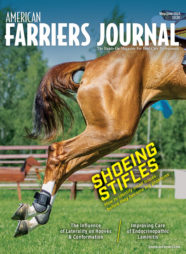A few weeks back, we emailed a single question survey to a number of veteran farriers. We asked them to look back at their farrier school experiences and identify the one thing they wished they’d learned that would have helped their careers and would help new students get started on the right foot.
If you think the majority wished they’d spent more time on forging, trimming or modifying shoes, think again. Instead, 27% would have liked more hours on running the business side of a farrier practice. They recognized that knowing how to trim and shoe is only part of running a successful farrier business.
While farrier schools represent a fountain of knowledge, teaching time is limited, and instructors can’t teach every aspect of what it takes to become a successful farrier. But looking back, here are a few items veteran farriers felt could have helped prepare them better for their careers.
The most recent American Farriers Journal Farrier Business Practices Survey indicates 70% of full-time farriers attended farrier school for an average of 12 weeks, this was followed up with 26 months apprenticing with a veteran farrier. (If you would like to be part of our 2018 Farrier Business Practices Survey, go to the AFJ website and type in AmericanFarriers.com/articles/10285)
More Business Skills
Some 13% asked for more instruction on how to manage their income, while 6% would have liked to have learned how to start saving for retirement when they launched their farrier careers. Others would have liked more instruction on pricing, billing, scheduling, handling taxes and insurance.
In hindsight, 20% would have liked to learn how to communicate more effectively with owners, veterinarians and trainers. Some felt sales training would have been helpful in selling their footcare services.
In the tool area, 3% wished they had learned the importance of investing in high quality tools right from the start. Others would have liked to learn more on how to modify tools.
Only 6% thought they needed more schooling on forging skills. Even fewer mentioned the need for additional instruction on modifying shoes, biomechanics, hoof balance and other basics. Others felt there should be more emphasis on farrier safety and the importance of daily exercise in staying healthy over the long haul.
Continue Learning
About 10% wished there had been more guidance on the value of apprenticeships, networking with fellow farriers and securing veteran farriers willing to serve as mentors.
Most agreed that attending farrier school is only the beginning of your hoof-care education. Some 17% felt instructors should place more emphasis on the importance of continuing your education throughout your career.
Others see a need for emphasizing professionalism. Several mentioned they hear more comments from horse owners about the professionalism of farriers rather than the quality of their trimming and shoeing work.
Based on this survey, many of these farriers wish they’d been taught more about the business side of shoeing. But when they were in the classroom, that’s probably not what they wanted to learn.
Read more thoughts from farriers on “What I Wish They'd Taught In Farrier School.”








Post a comment
Report Abusive Comment